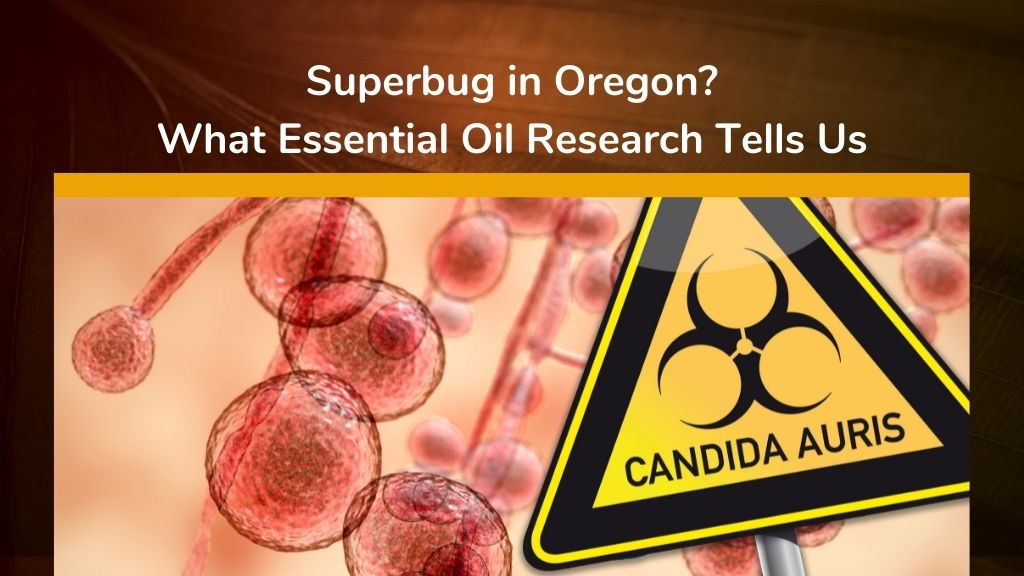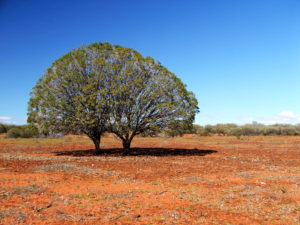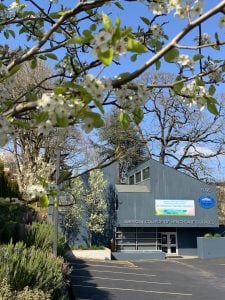
A news report is out today, December 29. 2021 that identifies the arrival of the first three cases of the “superbug” drug-resistant Candida auris in Oregon.[1] This alarming news sparks an urgent need to research powerful plant sourced alternatives.[2] A less well-known Australian essential oil known as Buddha Wood oil Eremophila mitchellii (Benth.) may provide just the therapeutic support we need.
Buddha Wood, also called False sandalwood E. mitchellii, is from the plant family Scrophulariaceae. Like a number of Australian essential oils it packs a punch providing the potential power to avert this looming global crisis. The Latin name Eremophila from Greek, “eremos” meaning “desert” and “phileo” meaning to love, (“love desert”), reveals where this endemic Scrophulariaceae genus likes to lay down its roots. The species name “mitchellii” was named after the explorer Sir Thomas Livingstone Mitchell (1792–1855), a translator, explorer and botanist who made three trips into the interior of Australia. Indigenous Australians, also known as aborigines, were said to have used it as a treatment for rheumatism by burning the twigs, raking the embers flat, covering with some sand, and then laying on the hot bed of Buddha wood embers.[3] Sounds pretty good in the midst of a cold, snowy Portland winter.
Eremophila wood oil contains eremophilanes, a class of rare, biologically-active bicyclic sesquiterpenes. Sesquiterpene ketones are also found in vetiver Vetiveria zizanioides (L.) and are potent antioxidants and cytotoxics.[4] [5] [6] The chemical composition of the wood, leaf, root, and branch oils of E. mitchellii all differ.

Promising antimicrobial activity of undiluted Buddha wood E. mitchellii oil against Candida albicans and five different bacteria was reported by Beattie in 2011[7]. The bacteria inhibited were E. coli, S. aureus, Salmonella typhimurium, and Alcaligenes faecalis. Candida albicans is a fungus and is one of many fungi building resistance to antifungals. It causes oral and vaginal thrush and denture-related stomatitis, a fungal infection that affects nearly two-thirds of U.S. denture wearers. Candida causes hospital-acquired bloodstream infections, which often have high mortality rates. [8] There is an opportunity for the natural product sector to develop a Buddha wood E. mitchellii oil mouthwash.
More topical and of particular interest given this latest news out of Oregon, is Buddha wood E. mitchellii oil’s action on C. auris. Candida auris is a fungus that acts more like a bacterium. Now reported to be in Oregon it has previously appeared on several different continents since emerging in 2009, and it morphs and acts differently in every location. Appearing first as an ear infection in Japan, it now invades the bloodstream.[9] Future studies are needed to evaluate if E. mitchellii wood oil will be useful in overcoming this emerging superbug. It may also provide synergy with current pharmaceutical antifungals and other effective treatment protocols such as starving the fungi of iron.[10]
As of August 31, 2021, the Centers for Disease Control and Prevention (CDC) has identified 3,043 patients colonized with C. auris, in the United States alone, and it is now a notifiable disease.[11] More than one in three patients with invasive C. auris infection (for example, an infection that affects the blood, heart, or brain) die.[12]
References-
[1] KTVZ.com (2021). Oregon reports first 3 cases of drug-resistant ‘superbug’ fungus Candida auris – KTVZ. KTVZ. Retrieved 29 December 2021, from https://ktvz.com/health/2021/12/28/oregon-reports-first-3-cases-of-drug-resistant-superbug-fungus-candida-auris/.
[2] KTVZ.com (2021). Oregon reports first 3 cases of drug-resistant ‘superbug’ fungus Candida auris – KTVZ. KTVZ. Retrieved 29 December 2021, from https://ktvz.com/health/2021/12/28/oregon-reports-first-3-cases-of-drug-resistant-superbug-fungus-candida-auris/
[3] Williams, C. J. (2013). Medicinal plants in Australia Volume 4: An Antipodean Apothecary. Sydney, AU: Rosenberg Publishing
[4] Mallavarapu, GR, Syamasundar, KV, Ramesh, S, Rao, BR. (2012) Constituents of south Indian vetiver oils. Nat. Prod. Commun. 7(2): 223-5.
[5] Luqman S., Kumar R., Kaushik S., Srivastava S., Darokar M.P., Khanuja S.P. (2009) Antioxidant potential of the root of Vetiveria zizanioides (L.) Nash. Indian. J. Biochem. Biophys. 46(1): 122-5.
[6] Sinha S., Jothiramajayam M., Ghosh M., Mukherjee A. (2014) Evaluation of toxicity of essential oils palmarosa, citronella, lemongrass and vetiver in human lymphocytes. Food. Chem. Toxicol. 68: 71-7. doi: 10.1016/j.fct.2014.02.036.
[7] Beattie, D., Karren, G., Waterman, P. Forster, I., Paul, R., Thompson, D. R., & Leach, D. N. (2011). Chemical composition and cytotoxicity of oils and eremophilanes derived from various parts of Eremophila mitchellii benth (myoporaceae). Phytochemistry, 72(4-5), 400-408. doi: https://doi.org/10.1016/j.phytochem.2010.12.011
[8] University of Buffalo (2019, May 24). Drug-resistant infections: If you can’t beat em, starve em, scientists find. Retrieved from https://www.sciencedaily.com/releases/2019/05/190524130224.htm
[9] Branswell, H. (2019, July 23). The superbug candida auris is giving rise to warnings and big questions. Retrieved from https://www.scientificamerican.com/article/the-superbug-candida-auris-is-giving-rise-to-warnings-and-big-questions/
[10] University of Buffalo (2019, May 24). Drug-resistant infections: If you can’t beat em, starve em, scientists find. Retrieved from https://www.sciencedaily.com/releases/2019/05/190524130224.htm
[11] Tracking Candida auris | Candida auris | Fungal Diseases | CDC. Cdc.gov. (2021). Retrieved 29 December 2021, from https://www.cdc.gov/fungal/candida-auris/tracking-c-auris.html.
[12] Centers for Disease Control and Prevention. (n.d.). Candida auris: A drug resistant germ that spreads in healthcare facilities. [PDF file]. Retrieved from https://www.cdc.gov/fungal/diseases/candidiasis/pdf/Candida_auris_508.pdf
Disclaimer: This article is for informational purposes only. It is not intended to treat, diagnose, cure, or prevent disease. This article has not been reviewed by the FDA. Always consult with your primary care physician or naturopathic doctor before making any significant changes to your health and wellness routine.
About American College of Healthcare Sciences

This commitment to our students and graduates reflects in our current survey results that reflect 98% of our students would recommend ACHS to a friend or family member.
We believe education is the most powerful tool for changing an individual and the world around us.
When a person enrolls as ACHS, it is vitally important that they graduate with tools they need to forge their own holistic and sustainable missions, build up their communities confidently and changing the face of healthcare with knowledge.
 President’s Message: End Of Year Reflectionsby American College of Healthcare Sciences●December 31, 2020
President’s Message: End Of Year Reflectionsby American College of Healthcare Sciences●December 31, 2020 Student Highlight: Wife and Husband Team Start New Businessby American College of Healthcare Sciences●December 22, 2020
Student Highlight: Wife and Husband Team Start New Businessby American College of Healthcare Sciences●December 22, 2020 Student Highlight: Holistic Health, Gratitude, and Smoothies |achs.eduby American College of Healthcare Sciences●December 17, 2020
Student Highlight: Holistic Health, Gratitude, and Smoothies |achs.eduby American College of Healthcare Sciences●December 17, 2020 3 Tips For Building Better Habitsby American College of Healthcare Sciences●December 10, 2020
3 Tips For Building Better Habitsby American College of Healthcare Sciences●December 10, 2020